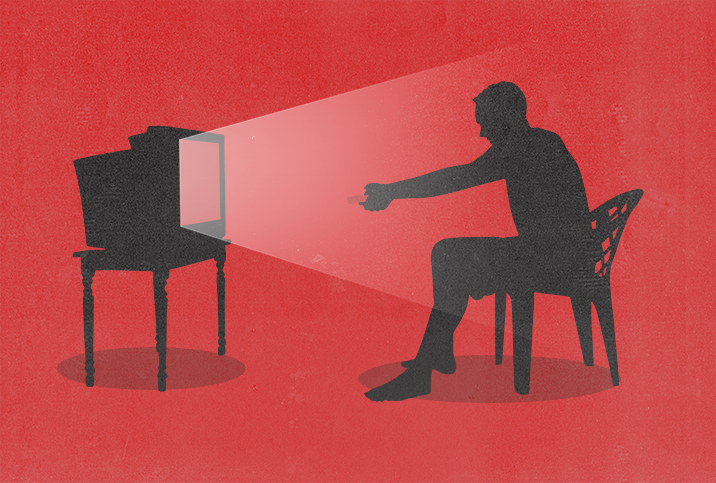Erotic Authors and Poets: America's Toxic Masculinity Avengers

"Toxic masculinity" is a popular buzzword, but the attention surrounding the concept is often oversimplified and reduced to the lowest common denominators. Instead of addressing toxic masculinity as a critical piece of society worth tearing down to fix class and gender conflicts, the concept gets used as an exercise in finger-pointing and ideological compartmentalization for cultural issues.
The easy and natural thing for someone to do these days is to place the responsibility of change on others' shoulders while touting their own ideals as righteously progressive and fundamentally correct. Since argumentation has supplemented discussion in many online public forums and in real life, where should we look for real insight into issues such as male aggression, gender disparity and sexual health concerns that cross the gender divide?
Taking a cue from human history, perhaps we should be listening to artists, authors and poets.
Fantasy and reality for all ages
Zach Mohr is a New Orleans-based author and performer of spoken word poetry, often reading his own original, erotic work at burlesque bars and art studios. He's also known for his original fairy tales and stories for children.
"In writing, it's become very important to me to express positive masculine patterns, embracing a strength and a beauty in that strength, but also expressing that a softness is allowed in masculinity and a beauty is allowed in masculinity," he said.
Mohr noted that he had a loving and supportive family growing up, but even within that context recognized negative expectations placed on men by society.
"I think male culture is expected to represent themselves as dominant within the relationship," he added. "And that means, sexually or nonsexually, the decisions you make [as men] are the ones that you and your partner will abide by and that they will fall in line with them…when in truth, whether it's another man or a woman or nonbinary individual you are with, you're both equal pillars in the foundation of what you're building, and when that involves your sex life, I mean, the choices you make, both of you need to be part of communicating that."
'I think that, as men, the toxic part of our society—with masculinity especially—involves us being heard, but not us listening.'
Communication is a big part of the mission for Mohr, whether he's engaging with people on the page, the stage or simply in his personal life. While his work often includes elements of fantasy, his views on how people should interact are incredibly grounded, based on years of experience traveling, performing, working and dating as a male-identifying and poly individual. From that context, Mohr has serious qualms about how relationships often play out concerning so-called traditional gender roles.
"You need to be able to listen to your partner," he said. "I think that, as men, the toxic part of our society—with masculinity especially—involves us being heard, but not us listening. And that becomes a bigger problem because we're not paying more attention to the wants and needs of our lovers or partners. We are telling them what it is they need. And that creates an unbalanced dynamic."
Mohr said it would be a mistake to label all toxic masculine behavior and ideals as originating from or being strictly spread by male-identifying individuals. There are certainly female politicians and public figures of all kinds who perpetuate harmful stereotypes and misogynistic ideals. Those ideals end up influencing the fundamental rights of women at legislative and individual levels.
"This is somebody else's body, their choice, their decision," Mohr said. "That goes the same in our sexual dynamics and relationships."
Education is everything
Walker Thornton is an author in Virginia who writes about sexuality to an audience that skews toward an older demographic of ages 45 to 65. Her book "Inviting Desire" uses a 30-day format to help women improve their experience of sex.
Thornton said a lot of men, even by the time she talks to them in their 50s or 60s, are often clueless about sex and the female anatomy. Thus, when her sons were in their teens and the Christmas season came around, she gifted them with literature that put female pleasure at the forefront and had conversations to match.
"I wanted them to make a shift and think about sex from a female point of view," she explained, adding this is something far too many men go without during their formative years.
Mental health can also be a colossal factor in developing patterns for equitable sexual enjoyment. Thornton believes we collectively overlook the mental and emotional conditions of young boys and their adult role models, especially regarding sex and intimacy. She said heavily traumatic experiences we might encounter in society are not the only incidents that affect us.
"There's gentle emotional abuse, there's lack of love from families," Thornton said. "There are other more subtle things that do play into it. And if a boy who has been sort of a late bloomer, he was slower in growth than the other kids or he's not really clear about how well developed he is, then if he shows up with those concerns about his adequacy, he's either going to be completely unable to have sex and sort of veer away from it or he's going to go over the top and overexaggerate.
"Those are the types who tend to be slightly more aggressive at times," she continued. "I mean, it shows up and we tend to think that women are going to have more problems than men in terms of sexual relationships when there is a mental health issue, but I think we're wrong. I mean, when it comes to body image, fears of being inadequate, having been bullied, all of those show up in how we figure out how to relate to somebody else."
These complex and burdensome variables in human development can generate a harsh impact on sexual communication and understanding.
"The person who already has some mental health issues, if they're rooted in self-esteem, they're highly unlikely to talk about sexual functioning, especially for guys," she said.
The current predicament and potential solutions
Sadly, the resources available to men for resolving toxic patterns around sex and other behaviors tend to mirror this country's resources for all mental health issues, which are inadequate as of now. We are a nation of medical neglect, so much so that even people presumably in a position to help may flounder at the opportunity.
It's a problem with real-world impacts, as Thornton noted, such as the rise of incel rhetoric. An incel is someone who defines themselves as unable to have a romantic and/or sexual relationship despite wanting one. Incel groups often foster hostile attitudes toward women with serious consequences.
"We're seeing with some of the incel movement and several mass shootings that have been related to men having been rejected by a woman, we have this conversation that needs to be had, but therapists are uncomfortable talking about it and it can be difficult to pull out of your own judgment about somebody," Thornton said. "And we forget that therapists are just as judgy as the rest of us. It is a complicated topic to deal with."
'They come in with an idea of, say, what erotic poetry may be. They leave feeling heard and seen in a way that they maybe weren't before.'
Toxic masculinity is undeniably complicated as it contains a number of components, from all aspects of mental health to specific aspects of sex and relationships. But "complicated" and "impossible" are not synonymous. Perhaps the solution for curing our culture of toxic masculinity is to close the various gender gaps in America and look toward our most human experiences of one another.
"I find there's a way to speak to people," Mohr explained. "Through writing, I find a way to speak to people so that they listen, especially doing spoken word poetry. They come in with an idea of, say, what erotic poetry may be. And they leave feeling heard and seen in a way that they maybe weren't before, or [it] touches something in them that maybe they've just barely dipped their toe into but then felt it wasn't accepted by popular culture."
As for the role men actually play in this societal progression, Mohr said there needs to be a combination of taking accountability while also claiming what has been denied to many men growing up in a toxic atmosphere.
"Intimacy autonomy for men is, I think, denied to us a lot; just how we're raised and when we're taught to separate our emotions from our reality," he explained. "As men within this culture, we have to fight against a lot of what we're initially raised with."





















Commentary